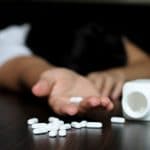Sleeping pills are a type of sedative-hypnotic medication used to relieve symptoms of sleeping disorders, restlessness, depression, or anxiety.
Sleep aids work by interacting with specific neurotransmitters in the brain and suppressing the central nervous system leading to sleepiness and sedation.
They are generally recommended for short-term use as they can be habit-forming and can actually make your sleep worse if taken long-term.
Long-term use can also increase the risk of an overdose, but an overdose can happen no matter how long you’ve taken the medication.
Sleeping Pills & The Risk Of Overdose
There’s a recommended dosage for most sleeping pills as there is with most prescription drugs. What the recommended dosage is can change depending on the specific medication.
If you go over that dosage, it can easily lead to an overdose.
Ambien
The recommended dose is 10 mg. An overdose and serious health problems can begin at 600 mg and death at 2000 mg.
Lunesta
The recommended dose is 3 mg and an overdose takes place at 270 mg, 90 times the recommended dose. Mixing Lunesta with alcohol or benzodiazepines can lead to a fatal overdose.
Sonata
The recommended dose is 10 mg and an overdose can take place at around 200 mg. There’s no risk of death unless alcohol is involved.
How Likely Is A Sleeping Pill Overdose?
While the above information is important, the majority of sleeping pills on the market are not as dangerous as they used to be. They are milder and most are not lethal on their own. This makes overdoses less fatal and ensures sleeping pills are not an effective method for suicide.
You can still overdose and it can still lead to life-threatening side effects, but sleeping medications have gotten safer over time.
Signs Of Sleeping Pill Overdose
There are several signs you can look out for if you suspect you or a loved one is experiencing a sleeping pill overdose.
Some signs include:
- extreme lethargy
- feeling hungover
- sleep apnea
- depressed breathing
- stumbling
- unresponsiveness
- unconsciousness
- abdominal pain
- loss of appetite
- constipation
- impaired motor control
- inability to focus
- slurred speech
- dizziness
- not breathing
- brain damage
Types Of Sleeping Pills
With so many people having difficulty sleeping, there are lots of different prescription sleeping pills available on the market today.
Some of the most common include:
- Ambien
- Lunesta
- Sonata
- Silenor
- Rozerem
- Restoril
- Halcion
- Desyrel
- Dalmane
- Doral
- Edluar
- Ativan
Over-The-Counter Sleeping Pills
There are also several over-the-counter (OTC) drugs that work like sleeping medications.
OTC sleep aids include:
- Advil PM
- Aleve PM
- aspirin/diphenhydramine
- Bayer PM
- Doan’s PM
- Ibuprofen PM
- Motrin PM
- melatonin
Side Effects Of Sleeping Pills
As much as sleeping pills help people get the rest they need and treat several sleep problems, they also come with a number of negative side effects.
These side effects may include:
- constipation
- sleepiness
- confusion
- memory problems
- balance problems
- changes in appetite
- daytime drowsiness
- shaking
- unusual dreams
- performing certain activities including sleep-driving, sleepwalking, or sleep eating (parasomnias)
- tingling in the hands, arms, feet, or legs
Withdrawal Symptoms
Once you become dependent or addicted to sleeping pills and try to stop, you may experience moderate or severe withdrawal symptoms. Withdrawal is your body’s response to the lack of the drug it’s become dependent on.
Sleeping pill withdrawal symptoms can include:
- mental health issues
- shakiness
- agitation
- insomnia
- overactive reflexes
- increased heart rate
- increased blood pressure
- increased body temperature
- sweating
- hallucinations
- cravings
- seizures
Due to these withdrawal symptoms, quitting on your own can be dangerous. A medical detox program is recommended so you are in a safe environment and medical professionals can treat your symptoms as they come up.
Treating A Sleeping Pill Overdose
Treatment for a sleeping pill overdose needs to happen very quickly as it can lead to long-term side effects.
Once you’re at the hospital, a few different treatment options may take place including:
- flumazenil: this drug reverses the sedation caused by sleeping pills
- stomach pumping: if someone has taken a large number of sleeping pills, healthcare providers may pump their stomach to remove the medication
- activated charcoal: activated charcoal may also be given to absorb the excess drugs in the body
- IV fluids: IV fluids may also be used to prevent dehydration and stabilize body functions
- respirator: a respirator may also be given if someone is having trouble breathing
Get Help For Substance Abuse
If you or a loved one are struggling with a sleeping pill addiction or another form of substance abuse, help is available.
At Northeast Addiction Treatment Center, we offer medication-assisted treatment, outpatient services, and several types of specialized therapies. To learn more, please contact us today.
Sources
Written by
Northeast Addition Editorial Team
©2024 Northeast Addition Center | All Rights Reserved
This page does not provide medical advice.



